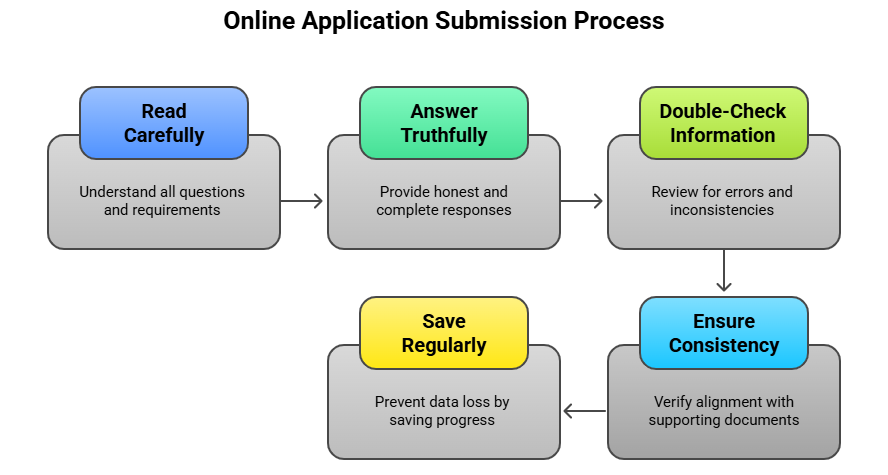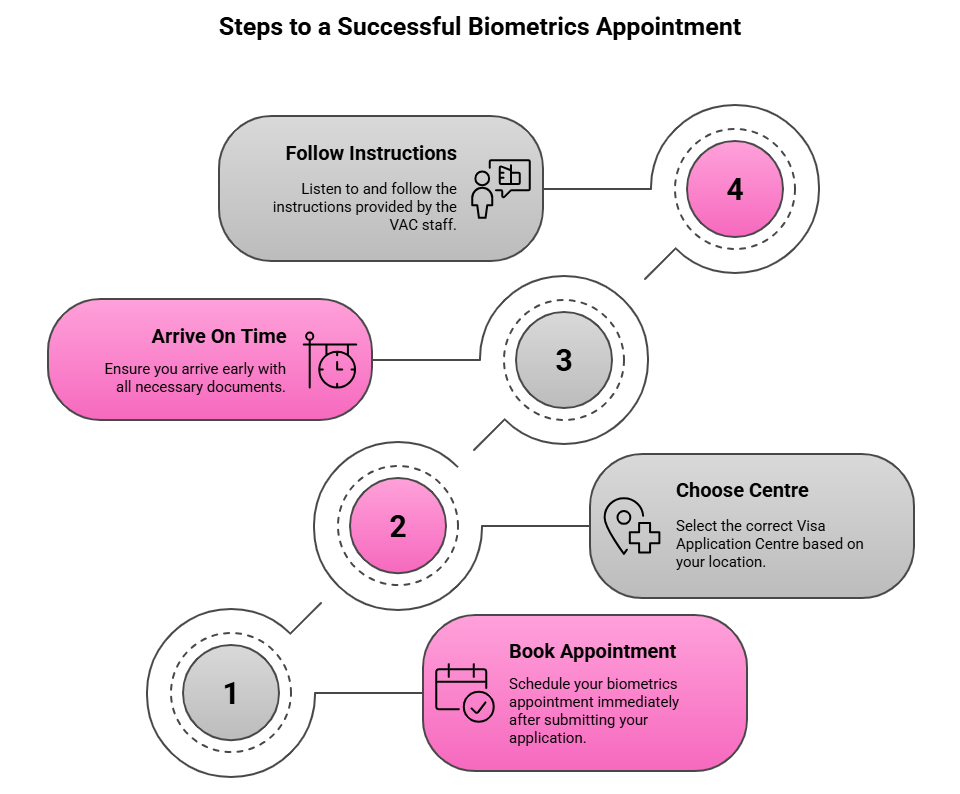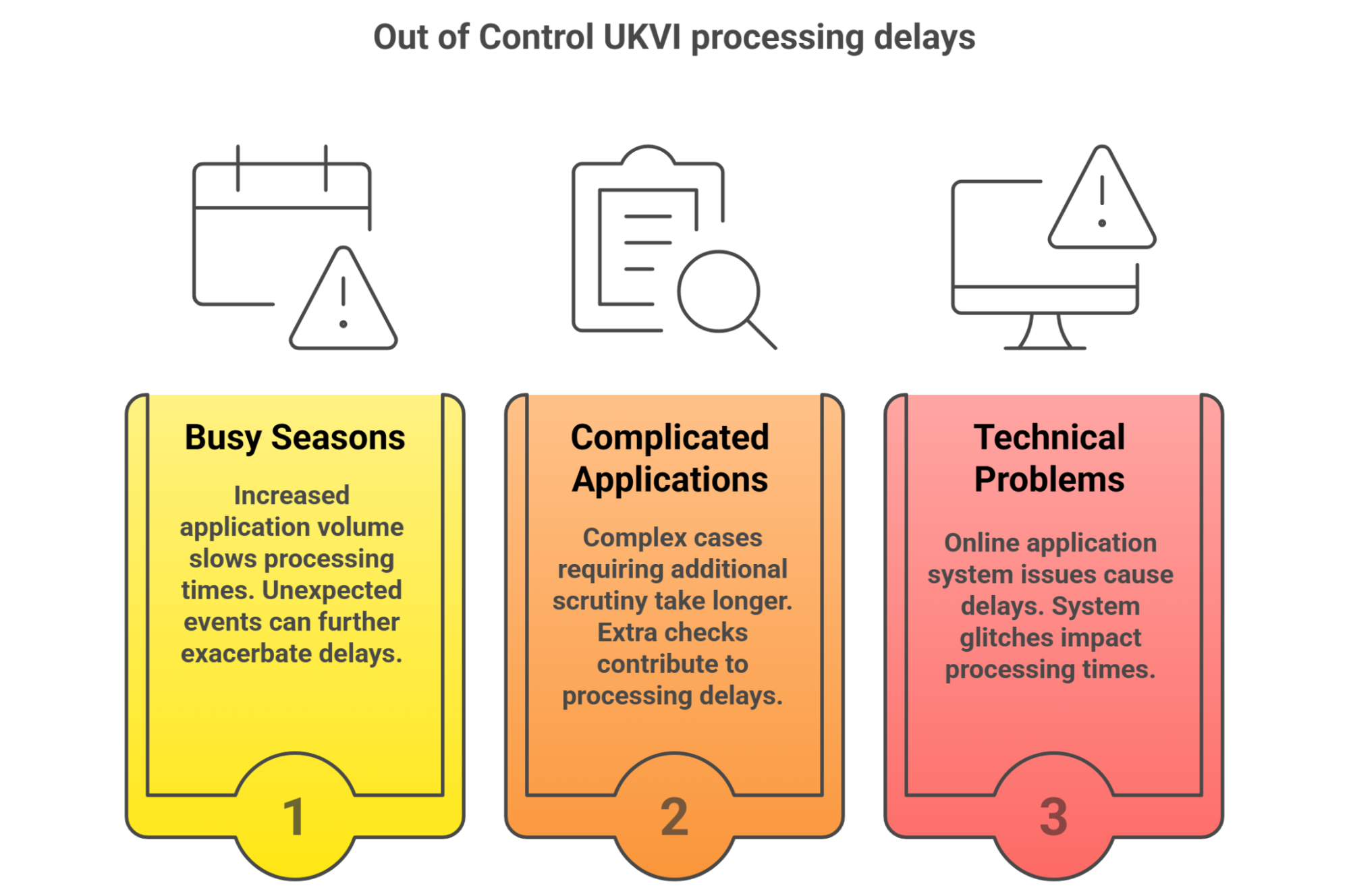A Guide to Avoiding Delays in UK Visa Applications
Applying for a UK visa can be a crucial step in pursuing work, study, family reunification, or simply experiencing the rich culture and opportunities the United Kingdom offers. However, the application process can sometimes be lengthy, leading to anxiety and disruption. While processing times are ultimately determined by UK Visas and Immigration (UKVI), there are numerous proactive steps applicants can take to significantly minimize the risk of delays.
To avoid UK Visa application delays, here is what applicants need to do:
1. Choose the Correct Visa Category from the Outset
Choosing the right visa type is the first step to avoiding delays. Your visa must match why you're going to the UK and how long you plan to stay. If you apply for the wrong visa, your application may be delayed or even refused.
|
Do Your Research: Take time to read about the different UK visa options on the official government website. Check who can apply, what each visa allows you to do, and how long you can stay. Know Your Main Reason for Travel: Are you going to the UK for work, study, visiting family, tourism, or medical reasons? There’s a visa for each of these. Don’t Guess: If you’re not sure which visa to choose, ask for help from official sources or a registered immigration advisor. Giving wrong information can cause serious problems. |
2. Careful Preparation of Supporting Documents
One of the main reasons for delays in UK visa applications is missing or incorrect documents. UKVI needs the right paperwork to check if you qualify for a visa.
|
Know What You Need: Check the official website to see the full list of documents required for your visa type. Use Original Documents: Send original documents unless the rules say copies are okay. If you can’t send the original, use certified copies. Check Expiry Dates: Make sure important documents like your passport and bank statements are still valid and up to date. Translate If Needed: If your documents are not in English, you must include certified translations from a trusted translator. The translation must be complete and correct. Keep Things Organized: Arrange your documents neatly and in the order suggested by UKVI or the Visa Application Centre. This makes your application easier to review. |
3. Submit a Complete and Accurate Online Application
The online application form is the primary record of your request. Errors or omissions can lead to significant delays or even refusal.
- Read Carefully: Answer all questions truthfully and completely. Do not leave any mandatory fields blank.
- Double-Check Information: Before submitting, thoroughly review every section of the application for any typos, inconsistencies, or incorrect dates. Pay particular attention to personal details, passport information, and travel history.
- Be Consistent: Ensure the information provided in your application aligns perfectly with the details in your supporting documents. Any discrepancies will raise red flags.
- Save Regularly: If the application is lengthy, save your progress frequently to avoid losing data due to technical issues.

4. Timely Payment of Fees and Immigration Health Surcharge (IHS)
Failure to pay the correct visa application fee and the Immigration Health Surcharge (if applicable) will halt the processing of your application.
- Understand the Costs: Check the current fee for your specific visa category and the IHS amount based on your intended length of stay.
- Use Accepted Payment Methods: Ensure you use a valid and accepted method of payment for the online transaction.
- Keep Proof of Payment: Retain confirmation of your payment for your records.
5. Book and Attend Your Biometrics Appointment Quickly
After you submit your online visa application and pay the fee, the next important step is to go to a biometrics appointment at a Visa Application Centre (VAC). Delays here can slow down the whole process.
- Book Right Away: As soon as your application is submitted, schedule your biometrics appointment. Spots can fill up fast, especially during busy times.
- Pick the Right Centre: Make sure you choose the correct VAC based on where you live.
- Be On Time: Arrive early with all required documents, like your appointment confirmation and passport. If you're late, you might have to reschedule.
- Follow the Rules: Listen carefully to the VAC staff and follow their instructions during the appointment.

6. Avoid Submitting Applications Too Early or Too Late
Submitting your application too far in advance might not expedite the process and could even lead to complications if your circumstances change. Conversely, applying too close to your intended travel date leaves little room for potential delays.
- Check Processing Times: Refer to the estimated processing times for your visa category on the GOV.UK website. These are indicative and can fluctuate.
- Apply Within the Recommended Window: Generally, it's advisable to apply no more than three months before your intended travel date, unless specific guidance for your visa category suggests otherwise.
7. Refrain from Making Unnecessary Contact with UKVI
While it's natural to feel anxious about your application, making frequent and unnecessary inquiries to UKVI can actually slow down the overall process. UKVI resources are focused on processing applications, and excessive contact diverts their attention.
|
Track Your Application Online: Utilize the online tracking tools provided by UKVI or the VAC to monitor the progress of your application. Only Contact for Urgent Matters: If there's a genuine emergency or a significant change in your circumstances that directly affects your application, then contact UKVI through the appropriate channels. Be prepared to provide your application details. |
8. Be Honest and Transparent
Providing false or misleading information in your application or supporting documents is a serious offense that can lead to outright refusal and potential future bans from entering the UK.
Declare Everything: Be truthful and declare all relevant information, including any previous visa refusals or criminal history, even if you believe they might negatively impact your application. Withholding information is likely to be discovered and will severely harm your chances.
9. Understand Potential Delay Factors Beyond Your Control
While you can take proactive steps, some factors that cause delays are outside of your control:
- High Application Volumes: During peak seasons or due to unforeseen global events, UKVI may experience a surge in applications, leading to longer processing times.
- Complex Cases: Applications with complex circumstances or requiring additional verification may naturally take longer to process.
- Technical Issues: Occasional technical glitches in the online system can cause temporary delays.

10. Seek Professional Advice When Needed
If you find the application process overwhelming or have complex circumstances, consider seeking guidance from a regulated immigration advisor.
- Choose Wisely: Ensure your advisor is regulated by the Office of the Immigration Services Commissioner (OISC) in the UK or a similar recognized body in your country.
- Understand Their Role: A good advisor can help you choose the correct visa category, prepare your documents accurately, and navigate the application process, potentially minimizing errors and delays.
UK Visa Processing Times
UK visa processing times vary depending on the visa category, application location (inside or outside the UK), and individual circumstances. Below is an overview of standard processing times for various visa types:
Applications from Outside the UK
|
Visa Type |
Processing Time |
|
Standard Visitor Visa |
~3 weeks |
|
Student Visa |
~3 weeks |
|
Skilled Worker Visa |
~3 weeks |
|
Health and Care Worker Visa |
~3 weeks |
|
Family Visa (Spouse/Partner) |
Up to 12 weeks |
|
British National (Overseas) Visa |
Up to 12 weeks |
|
Innovator & Start-up Visas |
~3 weeks |
|
Global Talent Visa |
~3 weeks |
|
Youth Mobility Scheme Visa |
~3 weeks |
Applications from Inside the UK
|
Visa Type |
Processing Time |
|
Standard Visitor Visa |
Up to 8 weeks |
|
Student Visa |
Up to 8 weeks |
|
Skilled Worker Visa |
Up to 8 weeks |
|
Health and Care Worker Visa |
Up to 8 weeks |
|
Family Visa (Spouse/Partner) |
8 weeks to 12 months* |
|
Indefinite Leave to Remain (ILR) |
~6 months |
Conclusion
Avoiding delays in your UK visa application hinges on meticulous preparation, accuracy, and adherence to the official guidelines. By understanding the requirements, submitting a complete and truthful application with all necessary supporting documents, and being patient while respecting the processing timelines, you can significantly increase your chances of a smooth and timely outcome. Remember that the official website is your primary resource for accurate and up-to-date information. By following these best practices, you can navigate the visa application process with greater confidence and hopefully embark on your journey to the UK without unnecessary delays.
Content Disclaimer: While this information was last updated in January 2026, we strongly suggest confirming all travel details with the appropriate governmental agencies, embassies, and airlines.
1
Steps to Secure Your eTA for the United Kingdom
- Step1: Complete the online application form by entering your passport details and required personal information.
- Step2: Make the payment securely online using a credit or debit card.
- Step3: Check your email for the payment confirmation and receive your eTA electronically.
thank you for this information